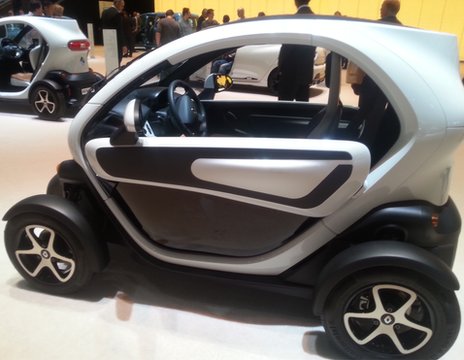The Porsche Panamera S is quite a car. Sleek, powerful and aerodynamic, it’s capable of 167mph.
But that’s not all. The version on display here in Geneva is also able to travel for about 20 miles on nothing but battery power.
It is, of course, a hybrid. It has an electric motor sitting alongside a 3-litre petrol engine. It is fast, powerful and remarkably economical. Porsche claims it can drive for 91 miles on a single gallon of petrol.
Yet if you can afford a Porsche, you can probably also afford a fairly steep fuel bill – so why has the company taken the time, trouble and expense to develop it?
“We know our duty and we have big concerns about the environment,” says Wolfgang Hatz, Porsche’s research director and a senior member of the company board.
“This technology helps us to fulfil our responsibilities, and it will help us to meet future requirements from regulators, for at least the next 10 to 15 years.”
What is happening at Porsche is very much a sign of the times. A decade ago, hybrids were still a fairly unusual sight at the big international motor shows.
Now, under pressure from regulators around the world, carmakers have been working hard to reduce emissions and fuel consumption. So hybrids have become decidedly mainstream.
Electric motors not only reduce emissions, they allow energy that would normally be lost – under braking, for example – to be recovered, boosting efficiency.
Tipping point
Now, some manufacturers are going a step further – and producing wholly electric cars aimed at the mass market. Last year, for example, BMW released the i3, a neat little city car that runs entirely on batteries.

The BBC’s Theo Leggett has a look around the BMW i3
BMW invested billions of euros in the new model – a remarkable move from a company that has built its reputation producing upmarket sports cars and luxury bosses’ barges. Arguably, it was also quite a risk.
But according to Ian Robertson, BMW’s global marketing chief, the market for electric cars is approaching a tipping point, where battery power will become as normal as petrol or diesel.
“If you look back over the past three years, the electric car market has multiplied by a factor of 25,” he says.
“There’s no doubt in our mind that it’s coming and it’s coming quickly and there is legislation supporting this in many cities.
“You can drive into London and pay zero congestion charge, for example. There are taxation incentives in the UK, but also in the US and Asia as well.
“I think we’re going to see a lot of growth in this area.”
‘Strong’ place in market
It is a view echoed at the French carmaker Renault. It too has invested heavily in electric cars, along with its partner company Nissan.
Half of its large stand here at Geneva is dedicated to battery-powered models, including the Zoe supermini, unveiled a year ago, as well as its quirky little two-seater buggy, the Twizy, and a Kangoo delivery van.
 The Twizy is part of Renault’s zero emissions programme
The Twizy is part of Renault’s zero emissions programmeRenault and Nissan had hoped to sell 1.5 million electric vehicles between them by 2016. That target has now been set back to 2020. But Vincent Carre, the commercial director of Renault’s electric car programme, is undaunted.
“We know our customers now,” he says, “and we remain totally convinced that electric cars have a strong, strong place in the market.”
Yet electric cars have been around for more than a century, without ever selling in large quantities. So why are mainstream manufacturers apparently deciding to invest in the technology now?
Further improvement
“It’s battery technology,” explains Jay Nagley, head of the automotive consultancy RedSpy. “People have been playing around with electric cars pretty much forever. Certainly since the oil crisis of 1973 people have been saying that electric vehicles are the future.
“But there was no way of powering them until lithium ion batteries were developed for cars over the past few years.
“Since that technology has been around, you’ve had the energy density available. Before that it simply wasn’t possible. And they will continue to improve every year now.”
 Tesla has been increasing production of its Model S
Tesla has been increasing production of its Model SThe effects of that change have certainly been dramatic. The development of potent cars such as the Tesla Model S has gone a long way towards destroying the stereotype of electric cars as slow and impractical.
Yet although sales of electric vehicles are growing rapidly, they remain a tiny fraction of the global total. For the moment, the internal combustion engine remains king.
Some manufacturers, too, remain unconvinced that battery-powered cars will ever make up a major segment of the market. Toyota, for example, believes that hydrogen fuel cell vehicles have more ultimate potential.
But it is no longer ridiculous to suggest that one day, at motor shows like this one, petrol or diesel cars could be the exception rather than the rule.


